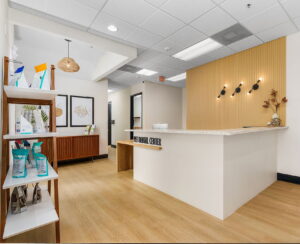
What to Expect at Pet Dental Center
We understand that your pet’s health and comfort are your top priorities, and we want to make sure you feel informed and confident throughout their dental care journey. Below is an overview of what you can expect during consultations and procedures at Pet Dental Center.
Consultations
During your initial consultation appointment, our team will take the time to thoroughly assess your pet’s oral health and create a customized treatment plan.
What Happens During the Consultation?
Medical Review: Upon arrival, you’ll meet with one of our technicians, who will go over the medical records we’ve received from your veterinarian and the details you’ve provided over the phone.
Oral & Physical Examination: The veterinarian you’re seeing for your appointment will perform a detailed oral and physical exam to assess your pet’s overall health and dental needs.
Treatment Plan Discussion: After the examination, the doctor will discuss treatment recommendations, explain the procedure, and answer any questions you may have.
Cost Estimate & Scheduling: You will receive a personalized treatment plan with details of the procedure and an estimated cost. Once everything is reviewed, our Client Care Specialists will assist you in scheduling a procedure appointment at checkout.
Pre-Anesthetic Bloodwork & Additional Testing
- Pre-anesthetic bloodwork is required before any procedure. If your pet has had bloodwork performed recently (typically within two months of this appointment), this may not be required again. You may have the option of having it performed during the consultation or we can schedule for you to come back for a diagnostic appointment at a later date.
- Cardiac evaluations may be recommended if we determine that additional precautions are needed for your pet’s safety.
- All Pre-Diagnostics are required to be completed no less than ten days prior to the procedure.
- Each pet has unique needs, so if you have any questions about preparation, please don’t hesitate to give us a call—we’re happy to help!
Procedure Day
When to Arrive & What to Expect
-Admission times vary but are typically on Monday, Tuesday, Wednesday or Thursday mornings.
–Your pet’s surgical order will be determined by the doctors based on the needs of all patients that day—we are unable to take requests for specific surgery order.
–Pick-up times are usually between 3:30 PM and 7:30 PM depending on when your pet’s procedure is completed.
Updates & Communication
We know how important it is to stay informed about your pet’s care. That’s why we provide multiple updates throughout the day, including:
Procedure Start Call: We will call you as soon as your pet’s procedure begins.
Imaging & Oral Exam Call: Once the doctor has completed the imaging and oral exam, they will call you to review findings and confirm the final treatment plan before proceeding.
Recovery Call: You’ll receive another call once your pet is out of surgery and in recovery, along with a pick-up time estimate.
Additional Updates: Depending on the timing of the procedure, we may call with additional check-ins.
Pick-Up & Aftercare
When you arrive to pick up your pet:
We will review pictures and imaging from the procedure to help you understand the treatment performed.
Our team will ensure you are completely comfortable with home care instructions before you leave.
Follow-Up Care
If your pet’s procedure requires a follow-up visit, we will schedule this 2-4 weeks after surgery—at no additional cost.
Our goal is to ensure your pet is healing properly and comfortable, and we are always available to answer any questions post-procedure.
We’re Here for You & Your Pet
At Pet Dental Center, we pride ourselves on exceptional patient care, thorough communication, and compassionate service. If you have any questions about your pet’s upcoming visit, scheduling, or aftercare, please don’t hesitate to give us a call—we’re happy to help!

